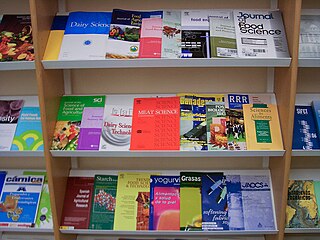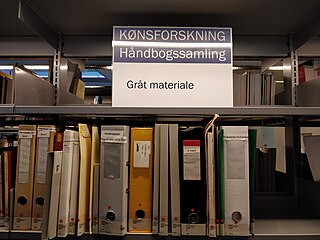
In academic publishing, a scientific journal is a periodical publication intended to further the progress of science, usually by sharing findings from research with readers. They are normally specialized based on discipline, with authors picking which one they send their manuscripts to.

The Cochrane Library is a collection of databases in medicine and other healthcare specialties provided by Cochrane and other organizations. At its core is the collection of Cochrane Reviews, a database of systematic reviews and meta-analyses which summarize and interpret the results of medical research. The Cochrane Library aims to make the results of well-conducted controlled trials readily available and is a key resource in evidence-based medicine.

Academic publishing is the subfield of publishing which distributes academic research and scholarship. Most academic work is published in academic journal articles, books or theses. The part of academic written output that is not formally published but merely printed up or posted on the Internet is often called "grey literature". Most scientific and scholarly journals, and many academic and scholarly books, though not all, are based on some form of peer review or editorial refereeing to qualify texts for publication. Peer review quality and selectivity standards vary greatly from journal to journal, publisher to publisher, and field to field.

An academic journal or scholarly journal is a periodical publication in which scholarship relating to a particular academic discipline is published. Academic journals serve as permanent and transparent forums for the presentation, scrutiny, and discussion of research. They nearly universally require peer review or other scrutiny from contemporaries competent and established in their respective fields. Content typically takes the form of articles presenting original research, review articles, or book reviews. The purpose of an academic journal, according to Henry Oldenburg, is to give researchers a venue to "impart their knowledge to one another, and contribute what they can to the Grand design of improving natural knowledge, and perfecting all Philosophical Arts, and Sciences."

Open access (OA) is a set of principles and a range of practices through which research outputs are distributed online, free of access charges or other barriers. Under some models of open access publishing, barriers to copying or reuse are also reduced or removed by applying an open license for copyright.

Scientific literature comprises scholarly publications that report original empirical and theoretical work in the natural and social sciences. Within an academic field, scientific literature is often referred to as "the literature". Academic publishing is the process of contributing the results of one's research into the literature, which often requires a peer-review process.

Elsevier is a Dutch academic publishing company specializing in scientific, technical, and medical content. Its products include journals such as The Lancet, Cell, the ScienceDirect collection of electronic journals, Trends, the Current Opinion series, the online citation database Scopus, the SciVal tool for measuring research performance, the ClinicalKey search engine for clinicians, and the ClinicalPath evidence-based cancer care service. Elsevier's products and services include digital tools for data management, instruction, research analytics, and assessment.
A citation index is a kind of bibliographic index, an index of citations between publications, allowing the user to easily establish which later documents cite which earlier documents. A form of citation index is first found in 12th-century Hebrew religious literature. Legal citation indexes are found in the 18th century and were made popular by citators such as Shepard's Citations (1873). In 1961, Eugene Garfield's Institute for Scientific Information (ISI) introduced the first citation index for papers published in academic journals, first the Science Citation Index (SCI), and later the Social Sciences Citation Index (SSCI) and the Arts and Humanities Citation Index (AHCI). American Chemical Society converted its printed Chemical Abstract Service into internet-accessible SciFinder in 2008. The first automated citation indexing was done by CiteSeer in 1997 and was patented. Other sources for such data include Google Scholar, Microsoft Academic, Elsevier's Scopus, and the National Institutes of Health's iCite.

Google Scholar is a freely accessible web search engine that indexes the full text or metadata of scholarly literature across an array of publishing formats and disciplines. Released in beta in November 2004, the Google Scholar index includes peer-reviewed online academic journals and books, conference papers, theses and dissertations, preprints, abstracts, technical reports, and other scholarly literature, including court opinions and patents.
Open access citation advantage (OACA), also known as FUTON bias is a type of bias whereby scholars tend to cite academic journals with open access (OA)—that is, journals that make their full text available on the Internet without charge —in preference to toll-access publications. The concept was introduced, under the FUTON bias name, by UK medical researcher Reinhard Wentz in a letter to The Lancet in 2002.

Grey literature is materials and research produced by organizations outside of the traditional commercial or academic publishing and distribution channels. Common grey literature publication types include reports, working papers, government documents, white papers and evaluations. Organizations that produce grey literature include government departments and agencies, civil society or non-governmental organizations, academic centres and departments, and private companies and consultants.

A review article is an article that summarizes the current state of understanding on a topic within a certain discipline. A review article is generally considered a secondary source since it may analyze and discuss the method and conclusions in previously published studies. It resembles a survey article or, in news publishing, overview article, which also surveys and summarizes previously published primary and secondary sources, instead of reporting new facts and results. Survey articles are however considered tertiary sources, since they do not provide additional analysis and synthesis of new conclusions. A review of such sources is often referred to as a tertiary review.
The Journal of the International AIDS Society (JIAS) is an official open-access, peer-reviewed, medical journal of the International AIDS Society. Founded in 2004 by Mark Wainberg, the journal covers all aspects of research on HIV and AIDS. Since October 2017, JIAS is published by John Wiley & Sons.

Family Process is a quarterly peer-reviewed academic journal covering research on family system issues, including policy and applied practice. It is published by Wiley-Blackwell on behalf of the Family Process Institute. Since 2007, the journal publishes its abstracts in Chinese and Spanish in addition to English. The journal publishes original articles, including theory and practice, philosophical underpinnings, qualitative and quantitative clinical research, and training in couple and family therapy, family interaction, and family relationships with networks and larger systems.
Evidence-based library and information practice (EBLIP) or evidence-based librarianship (EBL) is the use of evidence-based practices (EBP) in the field of library and information science (LIS). This means that all practical decisions made within LIS should 1) be based on research studies and 2) that these research studies are selected and interpreted according to some specific norms characteristic for EBP. Typically such norms disregard theoretical studies and qualitative studies and consider quantitative studies according to a narrow set of criteria of what counts as evidence. If such a narrow set of methodological criteria are not applied, it is better instead to speak of research based library and information practice.
Library assessment is a process undertaken by libraries to learn about the needs of users and to evaluate how well they support these needs, in order to improve library facilities, services and resources. In many libraries successful library assessment is dependent on the existence of a 'culture of assessment' in the library whose goal is to involve the entire library staff in the assessment process and to improve customer service.

Predatory publishing, also write-only publishing or deceptive publishing, is an exploitative academic publishing business model that involves charging publication fees to authors without checking articles for quality and legitimacy, and without providing editorial and publishing services that legitimate academic journals provide, whether open access or not. The phenomenon of "open access predatory publishers" was first noticed by Jeffrey Beall, when he described "publishers that are ready to publish any article for payment". However, criticisms about the label "predatory" have been raised. A lengthy review of the controversy started by Beall appears in The Journal of Academic Librarianship.
Beall's List was a prominent list of predatory open-access publishers that was maintained by University of Colorado librarian Jeffrey Beall on his blog Scholarly Open Access. The list aimed to document open-access publishers who did not perform real peer review, effectively publishing any article as long as the authors pay the open access fee. Originally started as a personal endeavor in 2008, Beall's List became a widely followed piece of work by the mid-2010s.
Evidence-based conservation is the application of evidence in nature conservation management actions and policy making. It is defined as systematically assessing scientific information from published, peer-reviewed publications and texts, practitioners' experiences, independent expert assessment, and local and indigenous knowledge on a specific conservation topic. This includes assessing the current effectiveness of different management interventions, threats and emerging problems and economic factors.
Metascience is the use of scientific methodology to study science itself. Metascience seeks to increase the quality of scientific research while reducing inefficiency. It is also known as "research on research" and "the science of science", as it uses research methods to study how research is done and find where improvements can be made. Metascience concerns itself with all fields of research and has been described as "a bird's eye view of science". In the words of John Ioannidis, "Science is the best thing that has happened to human beings ... but we can do it better."










